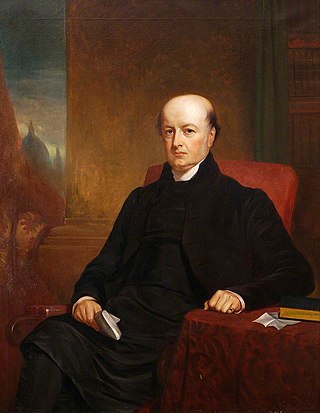
Charles James Blomfield was a British divine and classicist, and a Church of England bishop for 32 years.
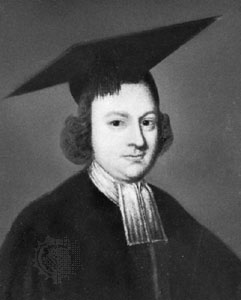
Christopher Smart was an English poet. He was a major contributor to two popular magazines, The Midwife and The Student, and a friend to influential cultural icons like Samuel Johnson and Henry Fielding. Smart, a high church Anglican, was widely known throughout London.
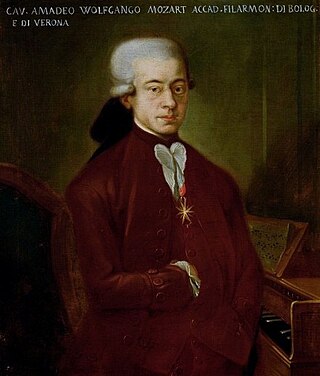
Exsultate, jubilate, K. 165, is a 1773 motet by Wolfgang Amadeus Mozart.
Jacques Berthier was a French composer of liturgical music, best known for writing much of the music used at Taizé.
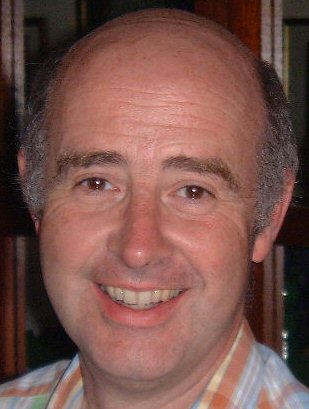
John Barnard is a Fellow of the Royal College of Organists (FRCO), an Associate of the Royal School of Church Music (ARSCM) and an active developer of church music as a composer, arranger, choir director, and organist in North West London, England.
Michael Alfred Baughen is a retired Anglican bishop.

The Jubilate Group is a Christian publishing house that administers copyright for more than sixty composers and writers. The group was founded by Michael Baughen in the 1960s. The group's first production was Youth Praise. In 1982, Jubilate published Hymns for Today's Church, one of the first hymn books with completely modernised language. In 1999, Sing Glory, Jubilate's most recent major hymn book, was published.
Donald Paul Hustad was a recognized leader in evangelical church music for six decades. Although he was an esteemed musician, composer, and teacher, Hustad's richest legacy resides in his informed criticism of evangelical church music and his well-developed philosophy of worship communicated through lectures, articles, and books.
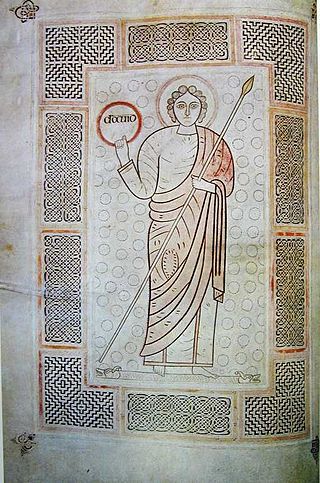
Psalm 100 is the 100th psalm in the Book of Psalms in the Tanakh. In English, it is translated as "Make a joyful noise unto the Lord, all ye lands" in the King James Version (KJV), and as "O be joyful in the Lord, all ye lands" in the Book of Common Prayer (BCP). Its Hebrew name is מִזְמוֹר לְתוֹדָה, 'Mizmor l'Todah' and it is subtitled a "Psalm of gratitude confession". In the slightly different numbering system in the Greek Septuagint version of the Bible, and in the Latin Vulgate, this psalm is Psalm 99. In the Vulgate, it begins Jubilate Deo, or Jubilate, which also became the title of the BCP version.

Michael Arnold Perry was a Church of England clergyman and one of the leading British hymnodists of the 20th century. He was closely associated with Jubilate Hymns.

Daniel Ernest Forrest Jr. is an American composer, pianist, educator, and music editor.

Jubilate Agno is a religious poem by Christopher Smart, and was written between 1759 and 1763, during Smart's confinement for insanity in St. Luke's Hospital, Bethnal Green, London. The poem was first published in 1939 under the title Rejoice in the Lamb: A Song from Bedlam, and edited by W. F. Stead from Smart's manuscript, which Stead had discovered in a private library.

Hymns and Spiritual Songs for the Fasts and Festivals of the Church of England, by Christopher Smart, was published in 1765, along with a translation of the Psalms of David and a new version of A Song to David. He wrote these poems while he was in a mental asylum and during the time he wrote Jubilate Agno.
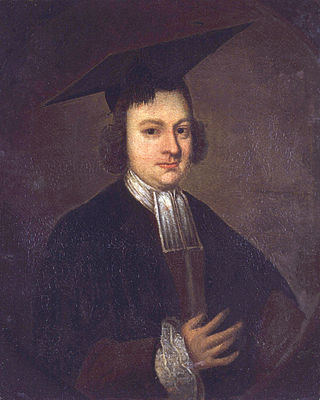
The English poet Christopher Smart (1722–1771) was confined to mental asylums from May 1757 until January 1763. Smart was admitted to St Luke's Hospital for Lunatics, Upper Moorfields, London, on 6 May 1757. He was taken there by his father-in-law, John Newbery, although he may have been confined in a private madhouse before then. While in St Luke's he wrote Jubilate Agno and A Song to David, the poems considered to be his greatest works. Although many of his contemporaries agreed that Smart was "mad", accounts of his condition and its ramifications varied, and some felt that he had been committed unfairly.

Utrecht Te Deum and Jubilate is the common name for a sacred choral composition in two parts, written by George Frideric Handel to celebrate the Treaty of Utrecht, which established the Peace of Utrecht in 1713, ending the War of the Spanish Succession. He composed a Te Deum, HWV 278, and a Jubilate Deo, HWV 279. The combination of the two texts in English follows earlier models. The official premiere of the work was on 13 July 1713 in a service in St Paul's Cathedral in London.
Noël Harwood Tredinnick is a British composer, organist, orchestrator and conductor. He was awarded a Lambeth DMus degree in March 2002. In Queen Elizabeth's Birthday Honours bestowed in 2021, he received a British Empire Medal for life-long services to Church Music and Music Education. Tredinnick has toured extensively in Europe, the US, Australia and South Africa as both lecturer and conductor.

Chandos Jubilate, HWV246, is a common name for a choral composition by George Frideric Handel. It was published as the first of the Chandos Anthems, and is known also as Chandos Anthem No. 1 and as Jubilate in D Major. A setting of Psalm 100, "O, be joyful in the Lord", it is the first in a series of church anthems that Handel composed between 1717 and 1718, when he was composer in residence to James Brydges, later 1st Duke of Chandos. The anthem was probably first performed at St. Lawrence's church, Whitchurch, near Brydges' country house. The work is written for a small ensemble of instrumentalists, solo singers and choir, and is approximately twenty minutes in length.
Christopher Martin Idle is a British hymnodist.

Chandos Anthems, HWV 246–256, is the common name of a set of anthems written by George Frideric Handel. These sacred choral compositions number eleven; a twelfth of disputed authorship is not considered here. The texts are psalms and combined psalm verses in English. Handel wrote the anthems as composer in residence at Cannons, the court of James Brydges, who became the First Duke of Chandos in 1719. His chapel was not yet finished, and services were therefore held at St Lawrence in Whitchurch. The scoring is intimate, in keeping with the possibilities there. Some of the anthems rely on earlier works, and some were later revised for other purposes.

Benjamin Britten's Jubilate Deo is a sacred choral setting of Psalm 100 in English, written in 1961 for St George's Chapel, Windsor Castle, "at the request of H.R.H. The Duke of Edinburgh". Britten scored the joyful music in C major for four-part choir and organ. A late companion piece to his 1934 Te Deum in C, it is also known as his Jubilate in C. It has been performed and recorded often, including on Prince Philip's 80th and 90th birthdays, and for his funeral service on 17 April 2021.












